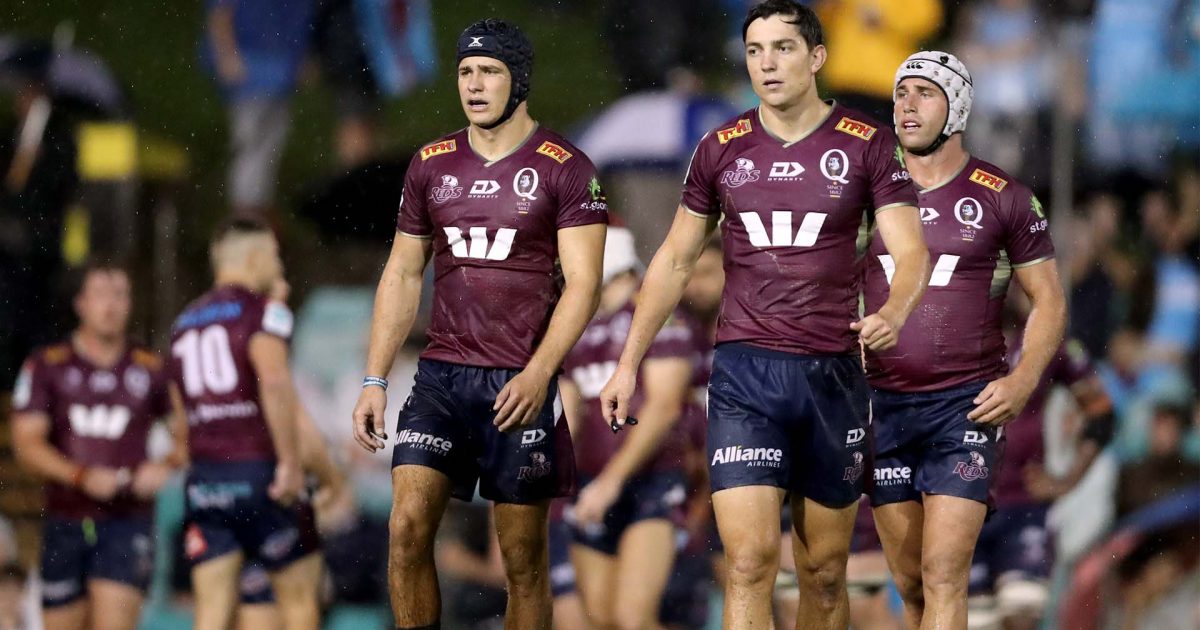Super Rugby star highlights how Australian sides can beat Kiwi teams this season

A Super Rugby Pacific star has outlined how the Australian teams can beat their Kiwi counterparts in the competition later this season.
The New Zealand sides are highly favoured to dominate the Australian franchises when they do battle in a few weeks’ time after having done so in recent editions of Super Rugby.
In years gone by, the Blues, Chiefs, Hurricanes, Crusaders and Highlanders have enjoyed a high level of success against their trans-Tasman rivals, which peaked between 2016 and 2018 when they went 40 games without loss against the Brumbies, Reds, Waratahs, Rebels and Force.
That disparity came under the microscope again last year after the Brumbies and Reds were the only Australian teams to register victories against Kiwi sides, with each franchise winning a game apiece from 25 total matches throughout the competition.
While cross-border matches are yet to take place this season due to the Covid-enforced rescheduling of multiple fixtures, the Kiwi outfits are expected to continue their dominance over the Australians when they begin to square off from April 22 onwards.
However, Crusaders halfback Bryn Hall has illustrated what the Australian teams need to do in order to buck the trend and push for places in the Super Rugby Pacific quarter-finals in the upcoming rounds.
Speaking on the Aotearoa Rugby Pod, Hall highlighted a key difference between the matches played in New Zealand and Australia thus far in Super Rugby Pacific.
The five-time title-winning Maori All Black noted that matches played between Kiwi teams have averaged a ball-in-play time of about 39-40 minutes, up to eight minutes longer than that of matches played in Australia.
According to Hall, those figures reflect that New Zealand teams play a faster brand of rugby than the Australian sides, who he said must adapt to that style of play if they are to beat the Kiwi franchises over the next couple of months.
“One stat that one of our analysis guys brought up was just around the difference in ball-in-play, the difference between Super Rugby Aotearoa and Super Rugby AU,” Hall said, referencing the New Zealand and Australian teams in Super Rugby Pacific.
“At the moment, the ball-in-play in New Zealand games is roughly 39-40 minutes in games… in the Australian games, there’s only been one game that’s been at that 38 minutes level of ball-in-play.
“It’s pretty much at that 32-minute mark of ball-in-play, so I think the ability of the Australian teams to be able to adapt and play more of a high-tempo game of [making] more tackles, having the ball in play and under that fatigue, I think that’s going to be a crucial part for the Australian teams moving forward because the ball is in play a lot more for New Zealand teams.
“Four-to-five minutes might not seem a lot for our viewers, but, actually, as players, having that extra time in game is actually a big part of running more metres, having longer phase counts and putting teams under more pressure.
“I think if the Australians can adapt to that when they do play the New Zealand teams, it’ll set them up really well to maybe get results in the back part of the year.”
Hall added that, of the Australian teams, the table-topping Brumbies loom as the strongest contenders to challenge the New Zealand sides after navigating the first six rounds of Super Rugby Pacific without defeat.
“I think the balance around their game is where I’m most impressed with them,” Hall told the Aotearoa Rugby Pod.
“Set piece-wise, they’ve got the ability to go to their lineout maul which has been a weapon for them over the years.
“They scrummage well but, I think as well, when they get their backs in the game, whether that be Tom Banks or Tom Wright, the amount of pace and x-factor they have out wide, they do it really well when they get the opportunities to be able to get there.
“I think their physicality in the breakdown as well, when they’re getting those big [ball-carrying] forwards going forward and on top of teams, it’s bringing the likes of Tom Wright, and their midfield pairings as well, to be able to have opportunities and being able to attack in their phase-play shape.
“They are sitting nicely and, I guess for them, it’s being able to accumulate as many points as they [can] – which they have, they’re undefeated – and then it gives them really good confidence [to beat] us New Zealand teams at the backend of the competition.”











































































